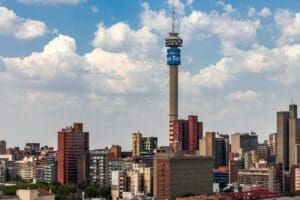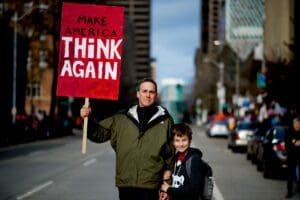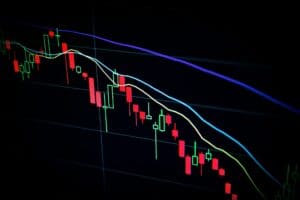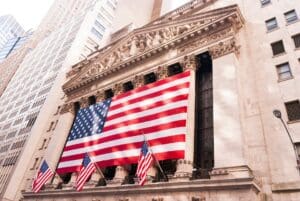What does a “K-shaped” recovery look like, and what it means for everyday Americans
By: MATTHEW ROZSA. —
During a Sunday appearance on “Fox News Sunday,” Symone Sanders, a senior campaign adviser to Democratic presidential candidate Joe Biden, lamented how recent economic gains were distributed unequally. “It is going well for folks at the top, but for folks who are middle class or below, it’s going down,” Sanders told host Bret Baier. “The question really is, is this [economy] working for working families, and the answer is no.”
The economic pickle Sanders described is sometimes called a “K-shaped” recovery — meaning one in which the wealthy benefit from the recovery while everyone else continues to suffer.
Regardless of one’s feelings about the Biden campaign, Sanders’ analysis is echoed by economists — who say that the nascent K-shaped recovery has troubling implications for the future of America’s economy.
“I do think the USA is seeing a K-shaped recovery,” Dr. Gabriel Mathy, a macroeconomist at American University, told Salon by email. “The working class has to continue working, and the government transfers and additional unemployment insurance payments are falling. They must work outside the home, exposing themselves to the virus, and with schools opening they must find childcare. Richer groups have seen their stock portfolios rise and they are working from home, doing okay.”
Indeed, as CNBC recently reported, the wealthiest Americans are prospering as the stock market rallies but millions of Americans face the prospect of long-term unemployment. If the current trends continue, it is entirely possible that Wall Street banks and large retail outlet chains will flourish while small business owners, restaurants and service profession workers suffer. Likewise, billionaires have seen tremendous gains during the pandemic: SpaceX and Tesla CEO Elon Musk saw his net worth rise to $82.3 billion, a 27.5 billion rise since the beginning of 2020. Jeff Bezos’ fortune rose $71.1 billion, and he is now worth $186 billion; he started the year at $115 billion.
In other words, the recession is over for the richest among us — or, in some cases, they never experienced a recession at all.
Dr. Karl Widerquist, an American political philosopher and economist at Georgetown University in their Qatar campus, echoed Mathy’s perspective.
“Although employment has come back unusually fast, it has not come back nearly as fast as the stock market, which has completely recovered, and the real estate market, which doesn’t even seem to have slowed down,” Widerquist wrote to Salon. “People used to tell a joke: ‘The stock market has predicted nine of the past five recessions’ (usually attributed to Paul Samuelson). They won’t be telling that joke again any time soon. This rise in asset prices is coming as poverty is unusually high, food insecurity is rising, and perhaps in most stark contrast to rising real estate prices, a very large number of Americans are unable to pay their rent or their mortgages.”
Dr. Richard D. Wolff, professor emeritus of economics at the University of Massachusetts Amherst, wrote to Salon that the K-shaped recovery shouldn’t come as a surprise. If anything, America’s economic system was designed decades ago to guarantee unequal wealth redistribution.
“The whole system is set up to achieve this end, which is why the last 40 years have seen widening gap of rich and poor,” Wolff explained.
“The rich and corporations use their wealth to shape politics, so it does not undo the results of an economy geared to inequality. In a political world of universal suffrage where capitalism pits an employer minority against an employee majority, such political corruption by money follows.”
Wolff noted that sometimes the poor and working classes revolt and force systemic changes that temporarily reduce income inequality — the most prominent instance being during Roosevelt’s presidency in the 1930s, which is no doubt why Biden is promising to emulate that administration — but Wolff pointed out that “once the crisis is past, the resumption of ‘normal capitalism’ likewise resumes the deepening of economic inequalities.”
Economists say if America wishes to halt the unequal recovery and create an economy that benefits all Americans, drastic reforms are needed — starting with a continuation of the temporary stimuli implemented in the immediate aftermath of the economic shutdown, but which have subsequently been allowed to expire.
“I think continuation of unemployment insurance benefits at the 600 dollar level is essential,” Dr. Mouhcine Guettabi, an associate professor of economics at the University of Alaska Anchorage, wrote to Salon. “This should be accompanied with aid to states and local governments so that we don’t see a second wave of layoffs due to budgetary pressures. Additionally, there should be extensions on the eviction moratoriums to ensure that the jobs crisis does not turn into a housing/homelessness crisis.”
Mathy expressed a similar thought to Salon, writing that “reauthorizing the pandemic assistance is important, and having additional transfers to households would help too. The CARES Act should have never expired, and additional help should be focused on struggling small businesses and poorer households.”
Widerquist told Salon that wealth redistribution on a large scale will also be necessary.
“The solution to increasing economic inequality is simple: taxation and redistribution,” Widerquist explained.
“We need taxes on people who own assets — on the people who own all the things we make out of our land and natural resources — to support redistribution to everyone.
With that in place, we all pay for resources we use and we all get paid for the resources everyone else owns or uses. As it is now, the people who own stuff get paid almost no matter what happens.”
One major obstacle to doing this, Widerquist observed, is that the current economy is “increasingly controlled by super-dominant corporations.”
As one example, he drew attention to how almost all social media platforms depend on content provided by its users, even though those same people rarely have any ownership over what they produce.
“It might be necessary to transform them into users’ cooperatives, or into partnerships between users and the administration,” Widerquist argued. “Similarly online sales, streaming, and download services like Amazon, Netflix, Audible, Spotify, and Hulu should perhaps be partnerships between four stakeholders: users, content creates, the administration, and the workers. This may become essential to overcoming an enormous power imbalance developing in America.”
Wolff offered a different possibility when speaking to Salon — namely, that alternatives like worker cooperatives (where workers own a business and reap rewards for its financial success based on the extent of their contributions) should be considered, and that the types of reforms implemented by Roosevelt in the 1930s are not enough.
“Without basic system change, policies of reform either fail or else achieve victories,” Wolff explained, citing the New Deal as an example of something that worked well to reduce inequality but was slowly undone over the next half-century. Wolff advocated for a “basic system change” — specifically, “transition to a worker-coop based economic system whose democratic decision-making in each enterprise would never distribute income as unequally as capitalism normally does. That would the obviate the need for socially divisive redistributions.”
Trump’s opponent, Biden, is not advocating for such a systemic change, but rather a modest Keynesian stimulus akin to a smaller version of the New Deal. Specifically, Biden has advocated for stimulus legislation “a hell of a lot bigger” than the $2 trillion Congress initially spent in response to the recession, investing in a Pandemic Testing Board, creating a 100,000-plus worker Public Health Jobs Corps, passing new regulations on banks and the financial sector, requiring businesses to provide paid emergency sick leave, increasing Social Security checks by up to $200 a month and likewise increasing the size of the relief checks sent to families.
Yet politicians rarely follow through on all their promises, whether due to congressional pushback or a lack of political will. In any case, as America’s K-shaped recovery shows no signs of slowing, the gulf between rich and poor will continue to widen. The only question is how long Americans will stomach it.
_______________________________________________________________
Matthew Rozsa is a staff writer for Salon. He holds an MA in History from Rutgers University-Newark and is ABD in his PhD program in History at Lehigh University. His work has appeared in Mic, Quartz and MSNBC. MORE FROM MATTHEW ROZSA






















